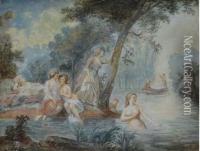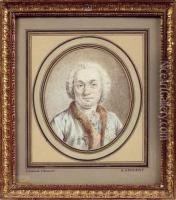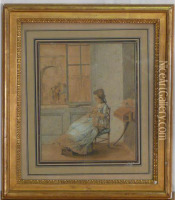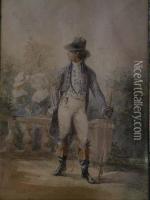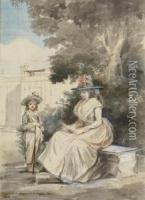Antoine Louis Fr. Sergent-Marceau Paintings
Antoine Louis François Sergent, later known as Sergent-Marceau, was a multi-talented figure in French history, known primarily for his work as an engraver but also recognized for his roles as a painter and a political figure during the tumultuous times of the French Revolution. Born on December 25, 1751, in Chartres, France, Sergent-Marceau grew up in an era of significant social and political upheaval, which would deeply influence his career and ideological beliefs.
Sergent-Marceau’s artistic journey began with his education in engraving, a field in which he would achieve notable success. His works were distinguished by their technical skill and the political fervor they often depicted or implied, resonating with the revolutionary sentiments of the time. Beyond his engravings, Sergent-Marceau was also accomplished in painting, contributing to his reputation as a versatile artist.
However, Sergent-Marceau’s impact was not limited to the arts. During the French Revolution, he became actively involved in the political scene, aligning himself with revolutionary ideals. His commitment to these ideals was reflected in both his art and his actions, as he participated in the tumultuous events of the era. This political engagement led him to adopt the additional surname Marceau, in honor of his brother-in-law, the revolutionary general François Séverin Marceau-Desgraviers, further symbolizing his dedication to the revolutionary cause.
Despite the dangers associated with his political activities, Sergent-Marceau managed to navigate the perilous landscape of the Revolution and the subsequent changes in regime. After the fall of Robespierre, he faced the risk of arrest and fled to Switzerland for a period, reflecting the personal risks entailed by his political affiliations.
Sergent-Marceau’s later years saw him returning to France, where he continued his work in the arts but maintained a lower political profile. His contributions to art and French cultural history remained significant, however, as did his enduring legacy as a figure who bridged the worlds of art and politics during one of France’s most volatile periods.
Antoine Louis François Sergent-Marceau passed away on September 9, 1847, leaving behind a body of work that continues to be appreciated for its artistic merit and its historical significance. His life and oeuvre offer a fascinating glimpse into the intersections of art, politics, and society during the French Revolution and the Napoleonic era, underscoring the role of artists as commentators and participants in the world around them.
